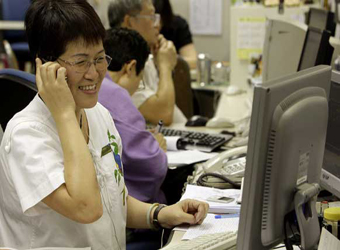Asian stock markets were mostly higher on Wednesday after China’s manufacturing sector showed signs of expansion in January and as investors looked ahead to the first review of policy this year by the Fed.
China’s official manufacturing Purchasing Mangers Index (PMI) for January came in at 51.3, higher than a forecast of 51.2.
“This marks six consecutive months of expansion in the country’s manufacturing sector and shows further stabilisation of Asia’s largest economy,” said Margaret Yang- market analyst at CMC Markets- in a note.
Meanwhile its official services sector PMI came in at 54.6 in January.
A figure above 50 represents expansion in the sector, while a figure below 50 indicates contraction.
The Fed is expected to hold steady, but investors will eye the tone of the statement after the U.S. central bank in December forecast as many as three interest rate hikes in 2017.
Also in focus is the disarray in currency markets, after U.S. President Donald Trump and his top economic adviser criticised Germany, Japan, and China, saying that the three countries’ devalued currencies was hurting American firms and consumers.
Overnight, U.S. top trade adviser Peter Navarro accused Germany of using a grossly undervalued euro to gain advantage over the U.S. and its own European Union partners.
These charges were rejected by German Chancellor Angela Merkel who said in a news conference that Germany is a country that has always called for the European Central Bank to pursue an independent policy.
The euro climbed after the comments, hitting a two-month high of $1.0811 and pressured the dollar lower below the 100 handle. At 12:30 p.m. HK/SIN, the euro/dollar stood at $1.0790.
Navarro and Trump also attacked Japan and China, remarking that these U.S. trading partners were devaluing their currencies to hurt American companies and consumers.
Yen weakened slightly during the Asian session against the greenback, to trade at 113.14, as the Australian dollar held steady at $0.7557.
The offshore yuan was weaker at 6.8326 against the dollar while the onshore yuan remains untraded during the Lunar New Year public holiday.
Dollar index remained under pressure trading at 99.691 after the comments, compared to levels above 100 seen this week.
Japan’s Nikkei 225 recovered from earlier losses of more than 0.5 percent to trade up 0.27 percent.
Shares of Toshiba gained 0.45 percent, earlier dropping as much as 3 percent after the Wall Street Journal reported that Toshiba will stop building nuclear power plants after incurring billions of dollars of losses to complete delayed projects in the U.S.
Gaming giant Nintendo dropped 3.27 percent after it cut its profit outlook by 10 billion yen ($88 million) due to weak console sales.
It is latest console, the Switch, is expected to be released in March.
Mitsubishi Motors rallied 12.56 percent, after it revised its full fiscal year guidance from operating losses of 27.6 billion yen ($244 million) to profits of 1 billion yen ($8.8 million) on the back of better cost reduction methods.
There is “appeal in contributions from new products, such as compact SUVs for global markets and minivans for Indonesia sales growth, synergies with Nissan Motor, and cost savings over the longer term,” said Masataka Kunugimoto who is research analyst at Nomura.
Australia’s ASX 200 was up 0.48 percent, underpinned by its gold sub-index, which upped 1.12 percent.
Over in South Korea, the benchmark Kospi added 0.51 percent, after trade data showed that January exports jumped 11.2 percent from the previous year, at its fastest pace of growth since 2012.
South Korea’s December industrial output slipped 0.5 percent in December, missing a Reuters poll forecast expecting an increase of 0.3 percent.
Hong Kong’s Hang Seng resumed trade from the Lunar New Year holiday break, and fell 0.71 percent.
Over in India, information technology industry lobby group Nasscom warned that the U.S. could impose tougher H-1B visa rules that unfairly targeting Indian workers.
This could impact the largest players in India’s IT sector, who use the H-1B visas to fly engineers and developers to service clients in the United States.
Shares of Tata Consultancy Services fell 1.22 percent, Infosys dropped 1.96 percent and Wipro were down 0.94 percent.
Mainland Chinese markets will remain shut through Thursday for the Lunar New Year holiday.
Markets in Vietnam, Malaysia, and Taiwan are also shut for holidays.
In other currency news, the Kiwi was weaker at $0.728, below $0.7300 levels after data showed that New Zealand’s jobless rate rose to 5.2 percent in the fourth-quarter and wage growth remained muted at 0.4 percent from the previous quarter, and 1.6 percent on-year.
On Tuesday during Asian hours, U.S. crude slipped 0.11 percent to $52.74 a barrel, as global benchmark Brent dipped 0.16 percent to $55.49.
Stateside, the Dow Jones industrial average fell 0.54 percent to close at 19,864.09, while the S&P 500 slipped 0.09 percent to finish at 2,278.87, and the Nasdaq finished up 0.02 percent at 5,614.79.
Source: CNBC


